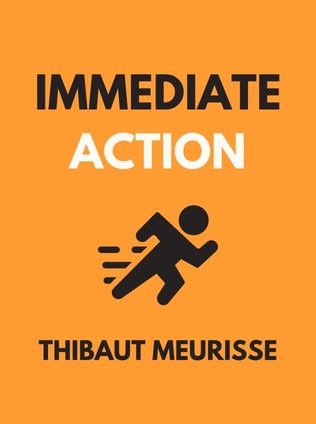
Immediate Action
The Explosive True Story of the Toughest--and Most Highly Secretive--Strike Force in the World
By Thibaut Meurisse
Published 01/1995
About the Author
Thibaut Meurisse is a prolific personal development writer and the author of more than 20 books. His works include Dopamine Detox (2021), Powerful Focus (2021), and Strategic Mindset (2021). In Immediate Action, Meurisse introduces a step-by-step method, complete with exercises and a workbook, to help you break the habit of procrastination in seven days.
Main Idea
In Immediate Action, Thibaut Meurisse argues that procrastination is a bad habit that we all have—but one that serves a specific evolutionary purpose. By understanding why we procrastinate, we can change our approach to tasks and cultivate a healthier relationship with our work.
Table of Contents
- Introduction
- What Is Procrastination?
- Why Do We Procrastinate?
- How Can We Minimize Procrastination?
- Recognize Faulty Patterns of Thinking
- Address the Feeling of Being Overwhelmed
- Cultivate Your Ability to Focus
- Make Sure You Fully Understand the Task at Hand
- Confront Your Fear of Not Being Up to the Task
- Stop Blowing Tasks Out of Proportion
- Conclusion
Introduction
Meurisse opens by acknowledging our mastery of procrastination. He explains that this bad habit has evolutionary roots, as it once helped us conserve energy and avoid unnecessary risks. Understanding this can help us change our behavior.
What Is Procrastination?
Meurisse defines procrastination as resistance to working on tasks we know we need to do. It's not something to be ashamed of; everyone experiences it. The key is to understand why we procrastinate and how to overcome it.
"Procrastination is a bad habit that we all have—but one that serves a specific evolutionary purpose." - Thibaut Meurisse
Psychologists support Meurisse's idea, explaining that procrastination involves an emotional or impulsive decision. Piers Steel, author of The Procrastination Equation, notes that procrastination is often a form of "self-harm," where we delay tasks against our better judgment. Similarly, Fuschia Sirois, author of Procrastination, explains that we often procrastinate to avoid negative emotions like boredom or anxiety associated with a task.
Many researchers also believe that procrastination involves trouble managing emotions, not time. Sirois suggests that practicing self-compassion—being kind to yourself and realizing that everyone procrastinates—can help decrease distress and increase motivation to complete tasks.
Why Do We Procrastinate?
According to Meurisse, procrastination is an evolutionary holdover. In dangerous environments, our brains protected us by avoiding unnecessary risks. Today, this same mechanism can prevent us from achieving our goals.
"When you feel compelled to put off a task, it may be because your brain perceives the task as either an unnecessary use of your limited energy or as a potential risk to your physical well-being." - Thibaut Meurisse
Sharad P. Paul, author of The Genetics of Health, notes that procrastination has been passed down through generations, suggesting it was effective in helping our ancestors survive. Early humans who avoided conflict likely lived longer and reproduced, passing this trait to their descendants.
Sign up for FREE and get access to 1,400+ books summaries.
You May Also Like
The Subtle Art of Not Giving a F*ck
A Counterintuitive Approach to Living a Good Life
By Mark MansonRich Dad Poor Dad
What the Rich Teach Their Kids About Money - That the Poor and Middle Class Do Not!
By Robert T. KiyosakiHow To Win Friends and Influence People
The All-Time Classic Manual Of People Skills
By Dale CarnegieFreakonomics
A Rogue Economist Explores the Hidden Side of Everything
By Steven D. Levitt and Stephen J. Dubner



















